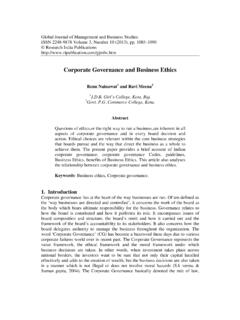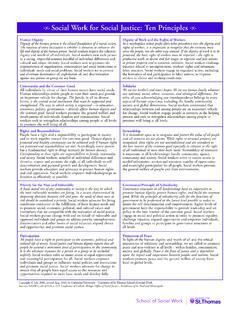Transcription of Research Governance Framework for Health and Social Care
1 Research Governance Framework for Health and Social Care Second edition, 2005. Research Governance Framework for Health and Social Care Foreword The Research Governance Framework outlines principles of good Governance that apply to all Research within the remit of the Secretary of State for Health . Research Governance is one of the core standards for Health care organisations. This second edition takes account of several developments. Much published guidance refers to Health Research , and particularly clinical trials. Regulations on clinical trials involving medicines took effect in 2004. The change in the law stimulated wide debate on good practice and risk based regulatory process. We have drawn lessons throughout this edition. The Research Governance Framework remains grounded on principles that apply generally to Research in Health and Social care. It applies to the full range of Research types, contexts and methods. While Research across Health and Social care should meet the same general standards of Governance , there are also important differences.
2 The mechanisms by which we achieve the standards depend on the context. I am delighted an implementation plan for Research Governance in Social care has been published. There has been new legislation on human tissue and on mental capacity, with provisions to protect those who participate in Research . Whatever the context, the interests of Research participants come first. Those responsible must be satisfied they have taken all reasonable steps to protect the dignity, rights, safety and well being of participants. We have to be frank about risks, and businesslike about managing them. John Reid, the Secretary of State for Health , said in the House of Commons on 22 March 2004, investment in Research saves lives, and that is why the Government wishes to make Britain the best place for R&D and innovation . Public confidence in Research , built on internationally recognised standards of good practice, is vital if we are to achieve that ambition.
3 Professor Sally Davies Director of Research and Development April 2005. ii Contents FOREWORD ii 1 PURPOSE AND SCOPE 2. FIGURE 1: Research Governance Framework . FOR Health AND Social CARE 5. 2 STANDARDS 6. INTRODUCTION 6. ETHICS 7. BOX A: PROTECTING Research PARTICIPANTS' RIGHTS 10. SCIENCE 13. INFORMATION 14. Health AND SAFETY 14. FINANCE 14. QUALITY Research CULTURE 15. BOX B: FEATURES OF A QUALITY Research CULTURE. IN THE NHS AND Social CARE 16. 3 RESPONSIBILITIES AND ACCOUNTABILITY 19. GENERAL 19. AGREEMENTS 19. SPECIFIC RESPONSIBILITIES 20. BOX C: A TO Z OF THE MAIN PEOPLE AND ORGANISATIONS. INVOLVED IN A Health OR Social CARE. Research STUDY 21. BOX D: SUMMARY OF KEY RESPONSIBILITIES OF PEOPLE AND. ORGANISATIONS ACCOUNTABLE FOR THE. PROPER CONDUCT OF A STUDY 23. BOX E: SPECIFIC RESPONSIBILITIES OF KEY PEOPLE. INVOLVED IN Research 25. iii Research Governance Framework for Health and Social Care RESPONSIBILITIES OF PARTICIPANTS 29.
4 RESPONSIBILITIES OF RESEARCHERS 30. RESPONSIBILITIES OF INVESTIGATORS AND THE. CHIEF INVESTIGATOR 30. RESPONSIBILITIES OF Research FUNDERS 33. RESPONSIBILITIES OF THE SPONSOR 34. RESPONSIBILITIES OF UNIVERSITIES AND. OTHERS EMPLOYING RESEARCHERS 37. RESPONSIBILITIES OF ORGANISATIONS PROVIDING CARE 38. RESPONSIBILITIES OF CARE PROFESSIONALS 41. RESPONSIBILITIES RELATING TO Research ETHICS COMMITTEES 41. 4 DELIVERY SYSTEMS 43. 5 MONITORING, INSPECTION AND FAILURES 46. ANNEX 49. iv Research Governance : Sets out principles , requirements and standards Defines mechanisms to deliver them Describes monitoring and assessment arrangements Improves Research and safeguards the public by: enhancing ethical awareness and scientific quality promoting good practice reducing adverse incidents and ensuring lessons are learned forestalling poor performance and misconduct Is for all those who: design Research studies participate in Research host Research in their organisation fund Research proposals or infrastructure manage Research undertake Research Is for managers and staff, in all professional groups, no matter how senior or junior Is for those working in all Health and Social care Research environments, including: primary care secondary care tertiary care Social care public Health .
5 1. Research Governance Framework for Health and Social Care 1 PURPOSE AND SCOPE. The Government is committed to enhancing the contribution of Research to Health and Social care. Research is essential to the successful promotion and protection of Health and well being, and also to modern, effective Health and Social care services. At the same time, Research can involve an element of risk, both in terms of return on investment and sometimes for the safety and well being of the Research participants. Proper Governance of Research is essential to ensure that the public can have confidence in, and benefit from, quality Research in Health and Social care. The public has a right to expect high scientific, ethical and financial standards, transparent decision making processes, clear allocation of responsibilities and robust monitoring arrangements. This document sets out a Framework for the Governance of Research in Health and Social care.
6 The Framework applies to all Research that relates to the responsibilities of the Secretary of State for Health . That is, Research concerned with the protection and promotion of public Health , Research undertaken in or by the Department of Health , its non Departmental Public Bodies and the NHS, and Research undertaken by or within Social care agencies. It includes clinical and non clinical Research ; Research undertaken by NHS or Social care staff using the resources of Health and Social care organisations; and any Research undertaken by industry, charities, Research councils and universities within the Health and Social care systems that might have an impact on the quality of those services. A core standard for Health care organisations is that they have systems to ensure the principles and requirements of this Research Governance Framework are consistently applied. Health care organisations have to take this standard into account in discharging their duty of quality under Section 45 of the Health and Social Care (Community Health and Standards) Act 2003.
7 The same principles apply across Health and Social care Research , but the way in which the relevant standards are achieved will differ according to the Research type, context and method. For example, compared with much Research in the NHS, Research in Social care differs in scale, volume and funding, as well as in the mix of stakeholders, the organisational context and the range of academic disciplines. The arrangements and mechanisms for implementing Research Governance in Social care Research are likely to have features that are particular to Social care. 2. The aim of this Framework is to bring together general principles of good practice. It refers to the law on clinical trials involving medicines. That does not mean it imposes the same procedures on other Research when the interests of participants and the Research methods do not call for them. The checklists of responsibilities in section 3 are there to help everyone reach agreement on arrangements that are proportionate to risk, and in line with good clinical practice.
8 Therefore, the Framework is offered also as a model for the Governance of Research in areas outside the direct responsibility of the Secretary of State for Health where poor practice could have a direct impact on the Health or well being of the public. The Framework is of direct relevance to all those who host, conduct, participate in, fund and manage Health and Social care Research . It is not just for investigators, managers or any one professional group. All service and academic staff, no matter how senior or junior, have a role to play in the conduct of Research . Participants in Research and the public in general can also help to ensure that standards are understood and met. This Framework seeks to promote improvements in Research quality across the board. As with clinical Governance and best value in Social care, Research Governance involves bringing general performance up to that of those at the leading edge. The Framework provides a context for the encouragement of creative and innovative Research and for the effective transfer of learning, technology and best practice to improve care.
9 The Framework aims to forestall poor performance, adverse incidents, Research misconduct and fraud, and to ensure that lessons are learned and shared when poor practice is identified. Learning from adverse events will promote good practice, enhance the ethical and scientific quality of Research , and safeguard the public. Health and Social care generate and draw on a wide range of innovative work and ideas from professionals, organisations and the public. Services must promote innovation while protecting participants from risk and waste. Innovation embraces a much wider range of activities than those managed formally as Research . Research can be defined as the attempt to derive generalisable new knowledge by addressing clearly defined questions with systematic and rigorous methods1. This document sets out the responsibilities and standards that apply to work managed within the formal Research context. Other documents on quality and Governance in the NHS and Social care set out standards and systems for assuring the quality of innovative work in non Research contexts.
10 1 This definition includes studies that aim to generate hypotheses as well as studies that aim to test them. 3. Research Governance Framework for Health and Social Care In common with other quality assurance and Governance systems, this Research Governance Framework describes: arrangements to define and communicate principles , requirements and standards;. delivery mechanisms to ensure that these are met2, and arrangements to monitor quality and assess adherence to standards nationally. Enquiries into adverse incidents relating to Research have criticised a lack of clarity about responsibility and accountability for Research in Health and Social care. This is important, given the very wide range of individuals and organisations that can be involved. The Framework pays particular attention to clarifying responsibilities and accountabilities. Listed are some of the individuals and organisations involved in Health and Social care Research : patients/users, their relatives, carers and organisations representing them.

















